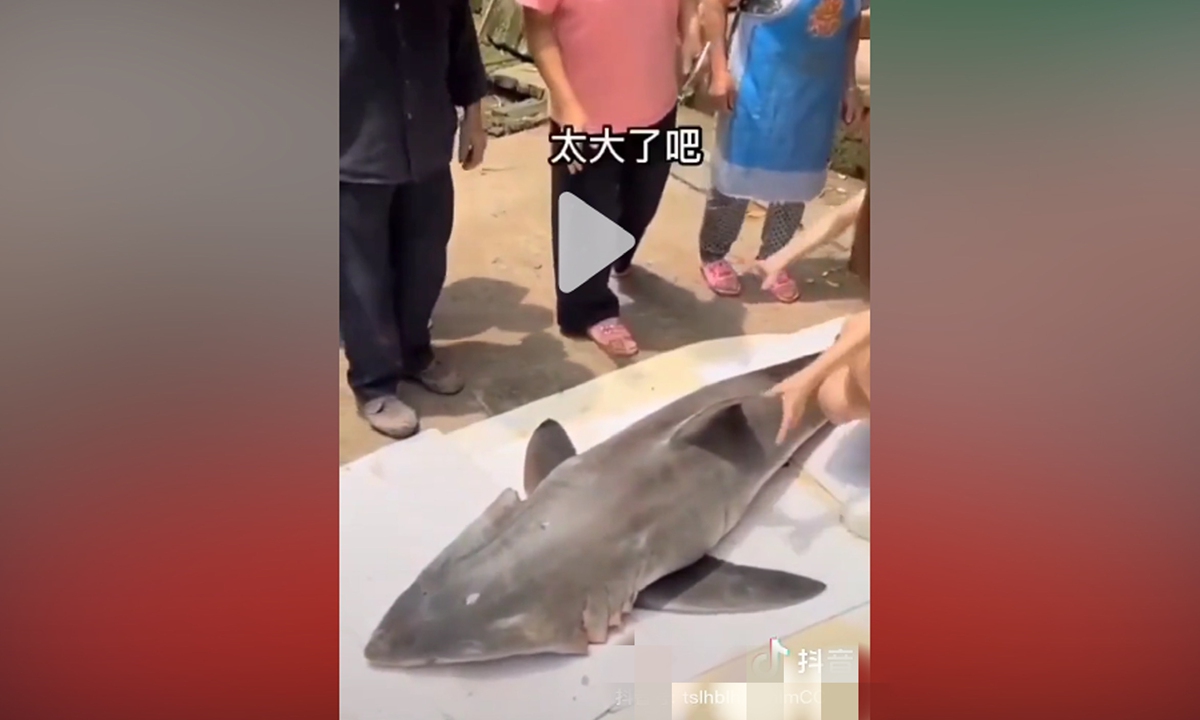
Photo: A screenshot of the video that went viral online
A video of a shark being boiled and barbecued by an internet celebrity known as Tizi triggered outrages among Chinese netizens recently. The food vlogger was aldo reportedly suspected of eating other endangered animals such as giant salamanders, crocodiles and peacocks on live-streaming.
The local police in Nanchong, Southwest China's Sichuan Province, confirmed that the shark in Tizi's video was a great white shark - an endangered species - and further investigation is being conducted, according to media reports. It is not clear if the giant salamander in the video reported by netizens is wild or not.
A video of a shark being boiled and barbecued by an internet celebrity known as Tizi triggered outrages among Chinese netizens recently. The food vlogger was aldo reportedly suspected of eating other endangered animals such as giant salamanders, crocodiles and peacocks on live-streaming.
The local police in Nanchong, Southwest China's Sichuan Province, confirmed that the shark in Tizi's video was a great white shark - an endangered species - and further investigation is being conducted, according to media reports. It is not clear if the giant salamander in the video reported by netizens is wild or not.
The Nanchong agriculture and rural bureau in Sichuan released a notice on Monday evening saying media reports claiming that food vlogger Tizi bought a great white shark from JD.com were not entirely correct. The proper information will be revealed after the police's investigation, the bureau said.
After a video of a shark being boiled and barbecued by a food vlogger named Tizi went viral on the internet, the local police in Nanchong, Southwest China's Sichuan Province, confirmed that the shark in Tizi's video was a great white shark - an endangered species - and a further investigation is being conducted, according to media reports.
On July 14, Tizi's video showing the process of boiling and cooking the shark went viral online.
According to the video, the vlogger showed the shark was "around two meters long" before it was transported to the rural region and was cut into parts there. The video also claimed that the shark was "artificially bred for consumption," according to Thecover.cn.
Netizens were outraged over the incident, with many calling out the vlogger for seeking attention via illegally consuming protected species.
A hashtag about the topic has gained over 520 million clicks on Sina Weibo, with many netizens criticizing the vlogger's behavior and calling for better protection of wild animals.
"How did the platforms allow such a video to be broadcast?" one netizen wrote. Some netizens called for strengthened management over internet celebrities.
Tizi has millions of fans on China's Douyin and Kuaishou short video platforms. She reportedly purchased the shark from JD.com, which was sourced from East China's Fujian Province, and the related personnel have been detained by the police, Thecover.cn reported on Monday, citing sources from the bureau of agriculture and rural affairs in Nanchong. The videos are no longer available on Tizi's account.
An official from Nanchong agriculture and rural bureau said that the investigation is underway, according to The Beijing News on Monday. The value of the animal is needed to file a case, and whether the shark was a juvenile or an adult will lead to different penalties, and the related identification is underway, said the official.
The vlogger is suspected of committing the crime of illegally purchasing rare and endangered wildlife products, and could face up to five years in prison or criminal detention and a fine, Chang Yachun, a lawyer from Beijing Kangda Law Firm, told the Global Times on Monday. Chang said the penalty depends on the value of the wild animal the suspect purchased.
The suspect shall be sentenced to fixed-term imprisonment of no less than 10 years and also be fined or have their property confiscated if the crimes are particularly serious, Chang said.
China has been making efforts to crack down on the illegal acts of hunting, selling or consuming wild animals. Since April this year, the national cyberspace authorities have conducted a special campaign to strengthen management over such illegal acts online.
The local police in Nanchong, Southwest China's Sichuan Province, confirmed that the shark in Tizi's video was a great white shark - an endangered species - and further investigation is being conducted, according to media reports. It is not clear if the giant salamander in the video reported by netizens is wild or not.
A video of a shark being boiled and barbecued by an internet celebrity known as Tizi triggered outrages among Chinese netizens recently. The food vlogger was aldo reportedly suspected of eating other endangered animals such as giant salamanders, crocodiles and peacocks on live-streaming.
The local police in Nanchong, Southwest China's Sichuan Province, confirmed that the shark in Tizi's video was a great white shark - an endangered species - and further investigation is being conducted, according to media reports. It is not clear if the giant salamander in the video reported by netizens is wild or not.
The Nanchong agriculture and rural bureau in Sichuan released a notice on Monday evening saying media reports claiming that food vlogger Tizi bought a great white shark from JD.com were not entirely correct. The proper information will be revealed after the police's investigation, the bureau said.
After a video of a shark being boiled and barbecued by a food vlogger named Tizi went viral on the internet, the local police in Nanchong, Southwest China's Sichuan Province, confirmed that the shark in Tizi's video was a great white shark - an endangered species - and a further investigation is being conducted, according to media reports.
On July 14, Tizi's video showing the process of boiling and cooking the shark went viral online.
According to the video, the vlogger showed the shark was "around two meters long" before it was transported to the rural region and was cut into parts there. The video also claimed that the shark was "artificially bred for consumption," according to Thecover.cn.
Netizens were outraged over the incident, with many calling out the vlogger for seeking attention via illegally consuming protected species.
A hashtag about the topic has gained over 520 million clicks on Sina Weibo, with many netizens criticizing the vlogger's behavior and calling for better protection of wild animals.
"How did the platforms allow such a video to be broadcast?" one netizen wrote. Some netizens called for strengthened management over internet celebrities.
Tizi has millions of fans on China's Douyin and Kuaishou short video platforms. She reportedly purchased the shark from JD.com, which was sourced from East China's Fujian Province, and the related personnel have been detained by the police, Thecover.cn reported on Monday, citing sources from the bureau of agriculture and rural affairs in Nanchong. The videos are no longer available on Tizi's account.
An official from Nanchong agriculture and rural bureau said that the investigation is underway, according to The Beijing News on Monday. The value of the animal is needed to file a case, and whether the shark was a juvenile or an adult will lead to different penalties, and the related identification is underway, said the official.
The vlogger is suspected of committing the crime of illegally purchasing rare and endangered wildlife products, and could face up to five years in prison or criminal detention and a fine, Chang Yachun, a lawyer from Beijing Kangda Law Firm, told the Global Times on Monday. Chang said the penalty depends on the value of the wild animal the suspect purchased.
The suspect shall be sentenced to fixed-term imprisonment of no less than 10 years and also be fined or have their property confiscated if the crimes are particularly serious, Chang said.
China has been making efforts to crack down on the illegal acts of hunting, selling or consuming wild animals. Since April this year, the national cyberspace authorities have conducted a special campaign to strengthen management over such illegal acts online.


